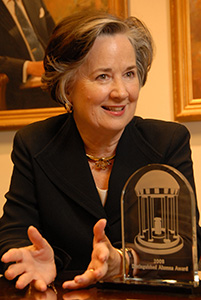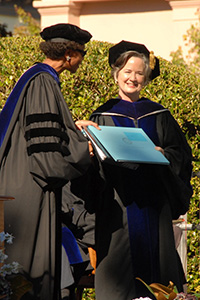Leading the Leaders
Debra Stewart thrived as a graduate student despite a chaotic campus in the 1970s. She now leads the nation's graduate schools.

Debra Stewart, President of the Council of Graduate Schools
When Debra Stewart first arrived at the University of North Carolina at Chapel Hill in 1970, she struggled in the chaos of the intense, politically charged campus. She struggled to balance her family life with the rigorous demands of graduate school. She struggled with a lack of self-confidence.
In the end, Stewart proved stronger than the challenges. She earned her doctorate in Political Science and went on to become one of the most visible leaders in graduate education in the United States.
Since July 2000, Stewart has served as president of the Council of Graduate Schools, the only national organization solely dedicated to advancing graduate education and research.
It was never easy.
“I was here in very turbulent times,” Stewart says. “Students around the country were at the barricades on a number of fronts. We were often in opposition, always against the administration, often against the faculty, and many times against each other.” One of Stewart's mentors at that time, Deil Wright, Professor of Political Science, explains: “She was overseas in the military with her husband before beginning graduate school. When she arrived, campus was in ferment—that's an understatement.”
The conflict in Vietnam and the bombing in Cambodia, along with other controversial issues of the day, helped create rampant political activism. Jane Fonda was the most important speaker on campus that year. Tensions about both the Civil Rights Movement and Equal Rights Amendment remained high.
Students organized protests, went on strike and set fires. Cafeteria workers had just gone on strike for better working conditions and pay, which led to student protests, overturned tables and intervention by Governor Bob Scott, who had Lenoir Dining Hall surrounded by state police. Nyle Frank, a famous campus prankster who was pursuing a doctorate in Political Science at the same time as Stewart, went around in a cape and declared himself King of the Invisible Kingdom of North Carolina and Carrboro the Paris of the Piedmont.
“It was a very difficult time filled with lots of turmoil,” Stewart concludes.
Rising above the Chaos
Despite the chaos, Stewart stayed focused on her research and her studies. “Stewart was unquestionably at the top of any of the rankings among the graduate students, not only in terms of intellect, but certainly in terms of her commitment to subject matter,” says Wright. “It's important to appreciate that our Political Science department, and the University's graduate programs in general, were really top-ranked at the time. We still are for that matter. So we were recruiting among the best and most promising graduate students. Debra very quickly and clearly distinguished herself as being the very top of that cadre of students.”
“When I was in graduate school, there was much less emphasis on directly accounting for the investment that the state, the university and the federal government made in your education. Accountability is very strong today.”
Stewart's focus and dedication contrasted sharply with the atmosphere on campus. “Debra was full of energy and very goal-oriented,” says Jurg Steiner, Professor of Political Science and Stewart's dissertation advisor.
Stewart knew she wanted to earn her doctorate and eventually become a professor. She would quickly realize her goal even though job openings were scarce. “She got a job at North Carolina State University at a time when the academic job market had really taken a turn for the worse,” explains Wright.
“When I was in graduate school, there was much less emphasis on directly accounting for the investment that the state, the university and the federal government made in your education. Accountability is very strong today.”
The Perfect Laboratory
Stewart now realizes that the swirling political tension helped create the perfect laboratory for her Political Science degree.
“It was the most intellectually exciting time that one could have been in graduate education,” she says. “In spite of the chaos that was going on around us in the world, in the country and in the University, I was able to pursue a very serious and very rigorous graduate degree program. And I did it with faculty who would put aside political differences, would put aside what was clearly bad behavior on the part of the graduate students and would be concerned primarily with our intellectual growth and development. At the end of the day, that is what graduate education is about.” Stewart knows as well as anyone what graduate education is about. She works passionately every day to ensure that American graduate education rises to its full potential.
Before joining the Council of Graduate Schools, Stewart was Interim Chancellor at UNC-Greensboro and then Vice Chancellor and Dean of the Graduate School at North Carolina State University. She has held numerous other positions of leadership on boards dedicated to the advancement of graduate education, such as chair of the Graduate Record Examination Board and the Council on Research Policy and Graduate Education. Just this past October, Stewart came to Chapel Hill to accept the Distinguished Alumna Award from the University.
Stewart knows a quality graduate education is a grueling journey, but the challenges and stresses of her own graduate work at Carolina were fundamental to her personal and professional growth. Her time at Chapel Hill helped mold her into the leader she is today.
“I often felt I didn't know the answer, I was challenged all the time, I did experience a lot of stress and I didn't have a lot of self-confidence,” says Stewart. “My graduate program provided the context and the sufficient support that I could be challenged without sinking, that I could question my ability without totally losing self-confidence.”
Leading Today's Graduate Schools

Provost Bernadette Gray-Little presents the Distinguished Alumna Award to Debra Stewart.
Stewart grew into a leader, and now she applies those lessons to help today's graduate students excel. She has always tried to utilize what she was learning. “She was not only interested in theory, but also in practical applications,” Steiner says.
Since Stewart's business is graduate education, applying what she has learned comes naturally. “For me, it's a very easy proposition, because I think I understand what a quality graduate education is, in part because I experienced one,” says Stewart.
Stewart says she understands “how we can move young people to their limits in terms of their capacity to test the frontiers of knowledge, and how we can do it in a way that does not destroy them, but in fact sustains them.”
Stewart's leadership helps graduate schools navigate a complex, dynamic world—a world not unlike the one she experienced during her time in Chapel Hill. The wars have changed, the economy has changed and graduate education has changed, but schools like Carolina are still developing leaders who impact local communities.
The composition of the graduate student population has also changed since Stewart attended Carolina. While the typical graduate student used to be a young male straight out of an undergraduate program, today graduate students are older and more diverse. “There is some research that indicates that the typical American graduate student now is a 32-year-old mother of two who has already had a career doing something,” says Stewart.
“The extent to which society asks graduate education and asks universities to account for the investment has changed as well,” says Stewart. “When I was in graduate school, there was much less emphasis on directly accounting for the investment that the state, the university and the federal government made in your education. Accountability is very strong today.”
Graduate schools have also focused more attention on specific career training. “There is much more emphasis today than there was when I was a student in preparing the doctoral student in a kind of comprehensive, global way for the jobs they get, not the jobs their professors had,” says Stewart.
American graduate schools have always trained leaders and been leaders; Stewart is living proof of that. She used the challenges of her own experience at Carolina to prepare herself to lead graduate education, to lead the leaders.
• Jeremy Cramer


